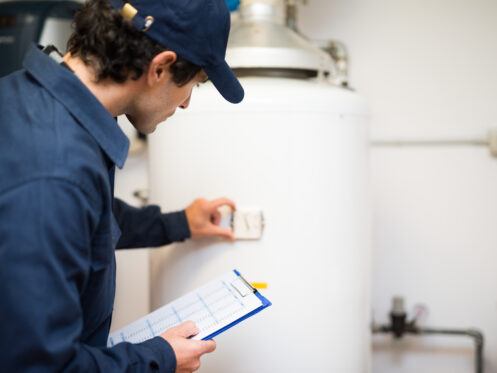Thinking about making the switch to a tankless water heater? Tankless water heaters come with far more benefits than drawbacks. Carefully assessing these pros and cons is essential to making an informed decision for your Orange, CA, home.
Benefits
Due to the consistently warm weather in Orange, tankless water heaters are an excellent energy saver. The mild winters make it less likely for pipes connected to the unit to freeze, which guarantees reliable functioning. Tankless units come with at least 10 other benefits.
1. Saves Money on Energy Expenses
Traditional water heaters have to constantly maintain a tank of hot water, leading to standby heat loss as energy dissipates through the tank walls. This results in increased energy bills as the heater works to maintain a set temperature even when hot water is not in use. Tankless water heaters eliminate this issue by heating water on demand, avoiding the need for constant heating. This efficient approach significantly reduces energy costs, making tankless heaters a more economical choice over time.
2. Extends a Friendly Hand to the Environment
Switching to a tankless water heater is an eco-friendly choice with several benefits for Mother Nature. These units reduce energy consumption, minimizing the home’s carbon footprint and contributing to conservation efforts. With a longer lifespan than traditional heaters, fewer units end up in landfills. Additionally, the compact design promotes efficient use of materials.
3. Meets High Hot Water Demands
Thermostatically, tankless water heaters heat water on demand, allowing for constant supply to several fixtures at once, in contrast to conventional heaters. This means they work great for bigger homes that use a lot of hot water since they can manage high demand without a storage tank. It also means you’ll never have to worry about running out of hot water, even during peak consumption.
4. Comes With Minimal Required Maintenance
Homeowners can save time and effort on maintenance tasks by switching to a tankless water heater. Many tankless versions last longer than conventional heaters with tanks, reducing the frequency of required replacements. Plus, there’s no need to clean it as often to prevent sediment buildup because there isn’t a tank. Most tankless water heaters require minimal maintenance in the form of descaling every one to two years.
5. Reduces the Risk of Water Leaks
Conventional hot water heaters experience lots of corrosion, pressure problems and tank issues that make them prone to leaking. Potential hazards from these leaks include structural problems, mold development and water damage. This puts both the home and its occupants at risk. With a tankless water heater, residents can enjoy a reduced risk of leaks. Their design eliminates the possibility of water damage by eliminating the need for a big reservoir that can burst.
6. Lowers the Risk of Legionella
Legionella thrives in the warm, humid environments created by conventional water heaters. It is a bacterium that can cause a serious respiratory infection known as Legionnaires’ disease. The danger of contamination increases when Legionella proliferates in stagnant water inside a tank. By only heating water on demand and doing away with storage tank stagnation, tankless water heaters reduce the potential for Legionella development. The constant circulation of hot water also makes the water supply safer by reducing the growth of bacteria.
7. Reduces Standby Heat Loss
Conventional devices constantly dissipate heat as they heat water in a storage tank. Instead of constantly heating water, tankless heaters do it on demand. This makes them more energy efficient since there is no reservoir to allow heat to escape through the tank walls.
8. Lower Amounts of Sediment Buildup
The design of tankless water heaters makes them less susceptible to silt accumulation than conventional heaters. By storing water in a tank, conventional systems encourage the gradual formation of silt as minerals settle. A tankless water heater, on the other hand, doesn’t have any storage tank and instead heats water as needed. Because there is no reservoir, silt has less of a chance to settle, which means the water is cleaner.
9. Quieter Operation
Homeowners typically find that traditional water heaters are a nuisance due to the noise they make from the heating components. Noises can occur from the expansion and contraction of the tank and during sediment disturbances. Installing a tankless water heater is an excellent way to overcome these noise issues. Since a storage tank isn’t constantly heating or expanding, a tankless device runs quietly. Additionally, there won’t be any silt accumulation-related rumbling or popping noises because there isn’t a reservoir.
10. Works in a Variety of Settings
Tankless water heaters excel in various settings and layouts, adapting well to compact spaces where traditional tank heaters might be impractical. Their compact design suits apartments, small homes and tight utility closets. Tankless units also work efficiently in larger residences, providing on-demand hot water without storage limitations. Additionally, they are ideal for off-grid or remote locations, where the absence of a tank simplifies installation.
Drawbacks
As with any appliance, tankless water heaters come with a few drawbacks. Most homeowners find the benefits of a tankless unit outweighs the cons.
1. Higher Initial Cost
The innovative technology and ability to heat water on demand in tankless water heaters can lead to a high initial investment. Installation costs may rise due to the need for more ventilation, particularly in situations where adjustments are necessary to include venting systems. Energy efficiency and savings in the long run usually justify the high upfront cost.
2. Inconsistent Performance in Cold Climates
Tankless water heaters often struggle to perform at their best in areas that experience a lot of cold weather. If the incoming water is too cold, the homeowner may have to adjust the unit’s operating temperature. This can lead to the system consuming enormous of energy, making it less efficient. The best way to avoid this problem is to insulate the unit or upgrade to a higher-capacity system. There are several ways to insulate a tankless water heater. The unit itself and the pipes both need insulation. If the unit requires external ventilation, the vent pipes will need insulation as well. To insulate the hot and cold water pipes, experts normally install heat traps.
3. Not Ideal for Low Demand
Some homes won’t benefit from tankless water heaters if they don’t have a high demand for hot water. This is because the most efficient way to run these units is at full or almost full capacity. If it doesn’t attain the minimum flow rate required to activate itself, heating may also be erratic. Speaking with a licensed plumber is the best way to determine whether a tankless unit can benefit your home.
We Care Plumbing, Heating and Air provides a lot of services to make your home healthier and more comfortable. We specialize in plumbing repairs, garbage disposals, ductless mini-splits, heat pumps, air purification and more. Give us a call now to figure out whether to install a tankless water heater in your home.







